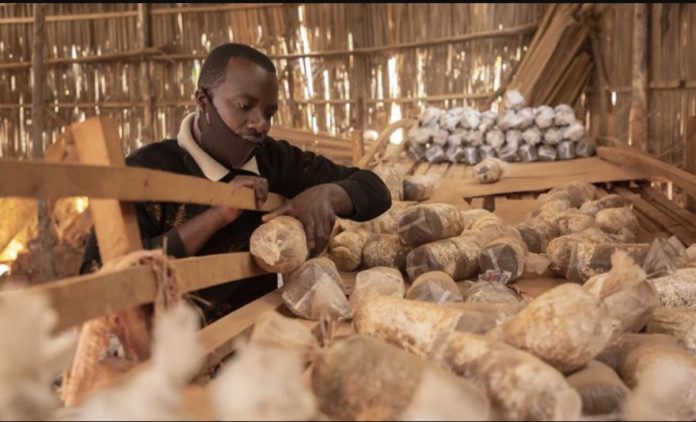Rwanda is leveraging the Juncao technology to scale up mushroom growing. Audace Hirwa, Director of Documentation, Publication, Communication and Technology Promotion Unit at Rwanda Agriculture and Animal Resources Development Board (RAB) said the technology is part of the country’s measures to invest in in research and technology transfer, training more farmers on mushroom growing to reduce poverty and malnutrition
The technology was invented by Professor Lin Zhanxi from China’s Fujian Agriculture and Forestry University in the 1980s, and has been shared with over 100 countries, including Rwanda.
“Actually using Juncao technology in mushroom cultivation requires mushroom shed, mushroom tubes, and fruiting body management,” said Mr. Audace.
Chinese-invented Juncao technology
The Chinese-invented Juncao technology to grow mushrooms uses low-cost materials. Juncao technology uses chopped grass as a substrate for growing edible and medicinal mushrooms and as forage for livestock.
The agriculture board is looking to promote the technology to be widely used by integrating mushroom cultivation into the overall development of kitchen gardens at people’s homes. The adoption of Juncao technology in Rwanda consists of research and demonstration activities, introduction and adaptation of suitable JUNCAO grass varieties, training and extension activities, and Post-harvest management.
About 35,000 mushroom farmers have so far been trained on Juncao technology. The beneficiaries include farmers, women’s associations, cooperatives, youth, orphans, AIDS organizations, Universities, vocational and technical colleges, hospitals, juvenile prison and so on.
Market challenges
In order to preserve mushroom yield, officials said, technologies such as Mushroom preservation in salt, mushroom grinding to get powder, mushroom drying, fried mushroom, mushroom packaging, cooking and other processing technology are evaluated at the Rwanda – China technology Demonstration Center.
He said that market challenges such as fluctuations of buying and selling prices also affect mushroom farmers.
“To resolve the problem, processing and post-harvest handling will facilitate the scale up of mushroom growing in Rwanda. In the past five years, the mushroom industry in Rwanda had low production,” he noted.
He said that currently there are 32 companies and 20 cooperatives that produce around 629.200 tubes and that more than 123 individual farmers are cultivating mushroom tubes.
“They harvest around 523,600 tonnes per year. Mushrooms are environmentally very friendly. They produce their own food from agricultural crop residues, and their spent composts/substrates can be used as animal feed, bio-fertilizers, and biogas,” he noted.
The government of Rwanda is working to ensure the capacity building mushroom growers and producers through the training, research and dissemination of the new strain of mushroom with the target to increase the production.








